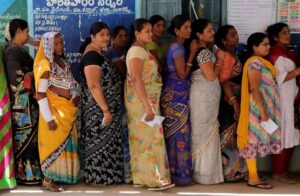The Real Face of PCOS in Indian Women: What a 2024 Landmark Study Reveals

Women stand in a line to cast their votes at a polling station, in Rangareddy district, Telangana, India, on May 13, 2024. REUTERS/Almaas Masood
If you’ve ever felt dismissed after bringing up irregular periods, hormonal acne, or unexplained weight gain, you’re not alone—and you’re certainly not imagining things.
A groundbreaking nationwide study published in JAMA Network Open in October 2024 just confirmed what many Indian women have long suspected: Polycystic Ovary Syndrome (PCOS) is extremely common, and it’s showing up in ways we’re not fully prepared for.
Let’s break down what this research revealed—and why it matters so much for your long-term health.
PCOS Is Affecting 1 in 5 Indian Women
The study titled “Prevalence, Phenotypes, and Comorbidities of Polycystic Ovary Syndrome Among Indian Women” analyzed over 6,000 women between the ages of 18 and 40, across both urban and rural regions of India.
Using the Rotterdam criteria, researchers found that 19.6% of women met the diagnostic threshold for PCOS.
That’s nearly 1 in every 5 women of reproductive age. To put it simply: if you’re in a room with 10 women, at least two of you might be navigating PCOS—whether you know it or not.
What Makes This Study So Important?
Many PCOS prevalence studies in India have been small, localized, or inconsistent in methodology. But this was the first large-scale, nationally representative survey that used the gold-standard Rotterdam criteria, making it one of the most reliable prevalence estimates to date.
It’s a wake-up call for healthcare providers, families, and most importantly—women themselves—to start taking hormonal health more seriously.
Phenotype C: The Quiet PCOS Type That Gets Missed
One of the most eye-opening findings? The most common PCOS phenotype among Indian women was Phenotype C—defined by:
- Hyperandrogenism (excess male hormones like testosterone)
- Polycystic ovaries visible on ultrasound
- But normal ovulation and regular(ish) periods
This is huge because Phenotype C can often go undiagnosed. Many women with this type don’t report the “classic” PCOS symptom of irregular cycles, so their concerns may be brushed off—despite experiencing severe acne, hair thinning, or difficulty losing weight.
As a women’s health coach, I’ve seen how many clients fall into this “silent” PCOS category—struggling for years without a diagnosis or proper support.
The Metabolic Storm Beneath the Surface
This study also highlighted how PCOS doesn’t just affect your ovaries—it has far-reaching metabolic consequences.
Among the women with PCOS in the study:
- 91.9% had dyslipidemia (abnormal cholesterol levels)
- 32.9% had NAFLD (non-alcoholic fatty liver disease)
- 24.9% had metabolic syndrome (a cluster of conditions that increase the risk of heart disease, diabetes, and stroke)
Let that sink in. This isn’t just about missed periods—this is a full-body condition that can affect your skin, your mood, your blood sugar, your liver, and your long-term health.
So What Can We Do About It?
First, knowledge is power—but guidance is everything.
While this research gives us clear numbers, it also exposes how many women may be walking around with undiagnosed or misdiagnosed PCOS—especially if they’re being treated based solely on their menstrual cycle.
Here’s what I recommend as a starting point:
- Track your cycle—not just dates, but energy, mood, digestion, skin, and sleep
- Get a comprehensive hormone panel done with a functional lens (not just LH and FSH)
- Focus on blood sugar balance—whether or not you have insulin resistance
- Support your liver to detox excess hormones (especially estrogen and androgens)
- Reduce stress—chronic cortisol dysregulation can worsen PCOS symptoms
- Find a practitioner who listens, validates your experience, and supports a root-cause approach
My Approach to Supporting Women with PCOS
In my virtual practice, I’ve helped women take back control of their hormones—not by suppressing symptoms, but by supporting the body holistically through the cycle.
Whether it’s through my Courses, products, or 1:1 health coaching, I teach women how to:
- Understand the root causes behind their symptoms
- Nourish their bodies in sync with their cycle
- Regulate insulin and cortisol with sustainable food and lifestyle strategies
•And most importantly—feel like themselves again
Final Thoughts
This study is a massive step forward in recognizing the real burden of PCOS among Indian women. But knowing the numbers isn’t enough—we need action, awareness, and support systems that truly understand women’s bodies.
✨ If you’re ready to explore your hormones more deeply and get support tailored to your body, you’re not alone.
Let’s start that conversation.
Work with me 1:1
Take the Period Quiz
Your hormones matter. Your health matters. You matter.

